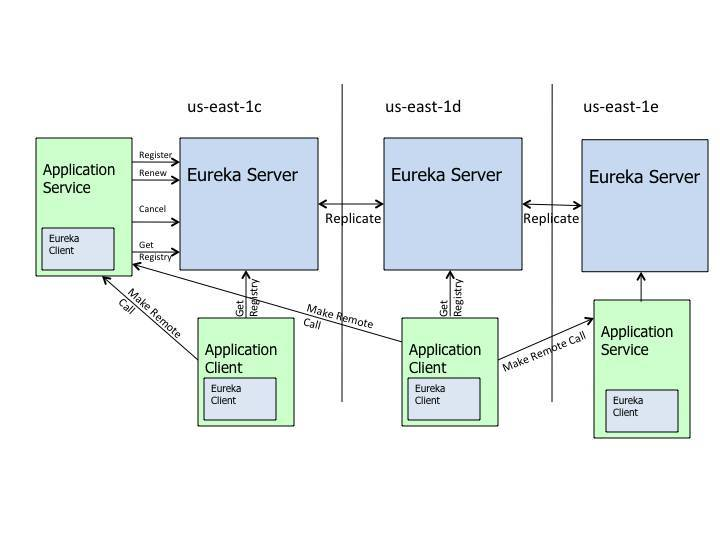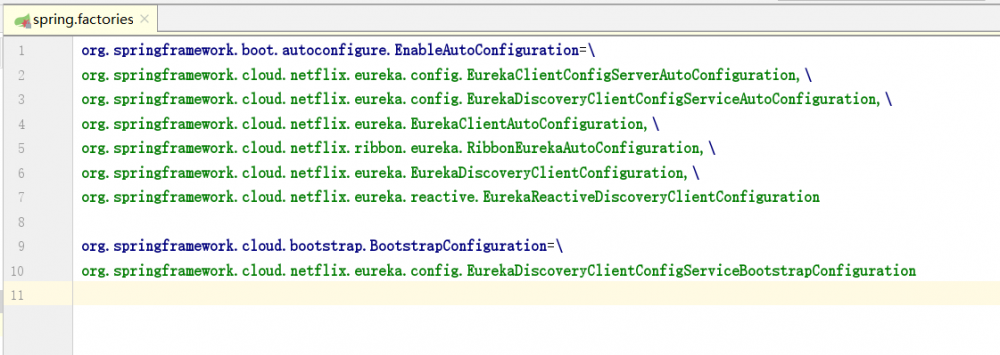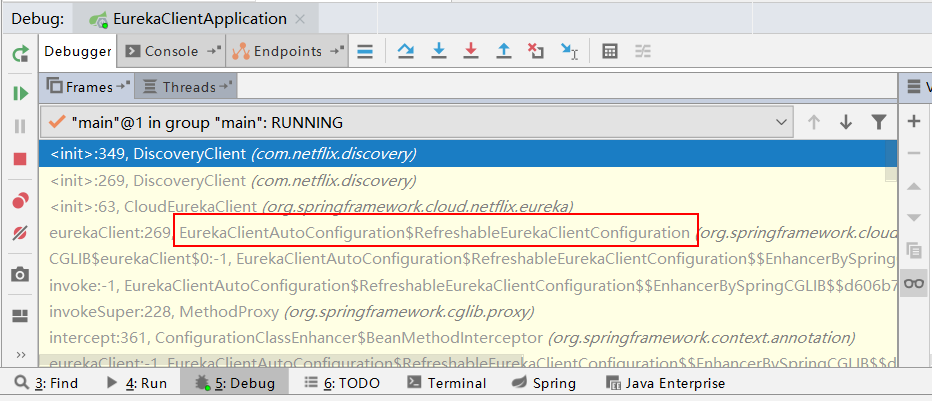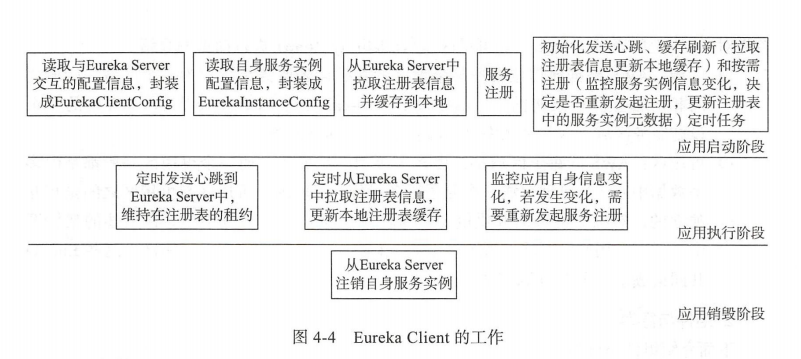Eureka启动流程-源码小段分析
本文参考自朱荣鑫老师的书《Spring Cloud微服务架构进阶》,强烈建议阅读本书。
Eureka是Netflix开源的服务治理组件,内部网络间的微服务调用已不再使用IP地址,而使用微服务名称,所以需要有Eureka这样的的组件存在,负责维护服务的状态。Spring Cloud整合了Eureka,使用Spring生态可以做到对其开箱即用。
除了Eureka,Spring Cloud还整合了其他Netflix组件,统称为Spring Cloud Netflix,Spring Cloud Netflix包含了服务治理Eureka、路由Zuul、客户端负载均衡Ribbon、熔断器Hystrix。
除了上面这些,开发中常用的还有声明式Http客户端Feign,也是Netflix公司开源的。Spring Cloud在Feign的基础上支持了Spring MVC的注解,叫OpenFeign。
言归正传,微服务离不开服务治理,本章探讨Eureka的使用和源码以及集群的实现原理。
总览

上图是Eureka官方的架构图。这里面有如下角色。
- Application Service:这是你的业务系统服务端(微服务)
- Eureka Client:这是Eureka客户端,可以理解为一个jar包,嵌入在你的业务系统Application Service中,用于向Eureka服务端注册信息等
- Application Client:这是你的业务系统客户端,嵌入了Eureka Client用于向Eureka服务端获取你要调用的Application Service信息,然后Application Client发起向Application Service的调用
- Eureka Server:Eureka服务器,管理所有的微服务状态
- us-east-1c:Eureka最初设计的目的是用于亚马逊云服务AWS的分布式系统的,所以引入了AWS的Region(区域)和Zone(Availability Zone可用区)的概念,一个Region包含多个Zone。上图中us-east-1c, us-east-1d, us-east-1e都属于Zone,这三个Zone属于us-east-1这个Region
Eureka Client提供了以下几个功能:
- 向Eureka Server注册自己
- 定时向Eureka Server续约
- 客户端下线
- 获取注册表
对应的,Eureka Server提供以下功能:
- 提供服务注册
- 接收服务心跳
- 服务下线
- 获取注册表中服务实例信息
- 服务剔除
- 集群同步
准备工作
为了方便跟踪问题,可以把netflix包的DEBUG日志打开。
logging:
level:
com.netflix: DEBUG
复制代码
同时,我们应该知道,Spring Boot的自动化配置原理是加载了类路径下的META-INF/spring.factories文件,如下图,eureka-client包中加载的自动化配置类如下:

分析步骤
通过Eureka DEBUG级别的日志打印,我们可以看到第一条有关Eureka的日志为:
2019-11-24 10:48:11.235 INFO 115648 --- [ main] com.netflix.discovery.DiscoveryClient : Initializing Eureka in region us-east-1 2019-11-24 10:48:13.030 INFO 115648 --- [ main] c.n.d.provider.DiscoveryJerseyProvider : Using JSON encoding codec LegacyJacksonJson 2019-11-24 10:48:13.030 INFO 115648 --- [ main] c.n.d.provider.DiscoveryJerseyProvider : Using JSON decoding codec LegacyJacksonJson 2019-11-24 10:48:13.232 INFO 115648 --- [ main] c.n.d.provider.DiscoveryJerseyProvider : Using XML encoding codec XStreamXml 复制代码
以上为类com.netflix.discovery.DisconveryClient打印的日志,在此处打一个断点,debug模式重新启动应用。在IDEA或Eclipse中查看调用栈,如下图:

从上图可以看出,该方法入口刚好吻合我们上面的分析,是Eureka的自动配置类EurekaClientAutoConfiguration触发的。其源码如下:
// 打印日志
logger.info("Initializing Eureka in region {}", this.clientConfig.getRegion());
// 配置文件中的register-with-eureka和fetch-registry如果都为false则不注册和拉去服务列表了
if (!config.shouldRegisterWithEureka() && !config.shouldFetchRegistry()) {
logger.info("Client configured to neither register nor query for data.");
this.scheduler = null;
this.heartbeatExecutor = null;
this.cacheRefreshExecutor = null;
this.eurekaTransport = null;
this.instanceRegionChecker = new InstanceRegionChecker(new PropertyBasedAzToRegionMapper(config), this.clientConfig.getRegion());
DiscoveryManager.getInstance().setDiscoveryClient(this);
DiscoveryManager.getInstance().setEurekaClientConfig(config);
this.initTimestampMs = System.currentTimeMillis();
logger.info("Discovery Client initialized at timestamp {} with initial instances count: {}", this.initTimestampMs, this.getApplications().size());
} else {
复制代码
同理,其他源码的分析也可以通过DEBUG日志和断点来分析。以下不再赘述。
Eureka Client源码解析
Eureka为了做到开箱即用,简化开发人员的开发工作,将很多与Eureka Server交互的工作隐藏起来,自主完成。在应用的不同阶段执行不同工作,如下图。

从上面代码
logger.info("Initializing Eureka in region {}", this.clientConfig.getRegion());
复制代码
打断点逐步跟踪,可以发现Eureka Client的执行步骤如下:
1. 向Eureka服务器拉取全量注册信息
代码位于DiscoveryClient#fetchRegistry方法中。
private boolean fetchRegistry(boolean forceFullRegistryFetch) {
Stopwatch tracer = this.FETCH_REGISTRY_TIMER.start();
label122: {
boolean var4;
try {
Applications applications = this.getApplications();
// 如果增量式拉取被禁止,或者Applications为null,进行全量拉取
if (!this.clientConfig.shouldDisableDelta() && Strings.isNullOrEmpty(this.clientConfig.getRegistryRefreshSingleVipAddress()) && !forceFullRegistryFetch && applications != null && applications.getRegisteredApplications().size() != 0 && applications.getVersion() != -1L) {
this.getAndUpdateDelta(applications);
} else {
logger.info("Disable delta property : {}", this.clientConfig.shouldDisableDelta());
logger.info("Single vip registry refresh property : {}", this.clientConfig.getRegistryRefreshSingleVipAddress());
logger.info("Force full registry fetch : {}", forceFullRegistryFetch);
logger.info("Application is null : {}", applications == null);
logger.info("Registered Applications size is zero : {}", applications.getRegisteredApplications().size() == 0);
logger.info("Application version is -1: {}", applications.getVersion() == -1L);
// 全量拉取注册表信息
this.getAndStoreFullRegistry();
}
applications.setAppsHashCode(applications.getReconcileHashCode());
this.logTotalInstances();
break label122;
} catch (Throwable var8) {
logger.error("DiscoveryClient_{} - was unable to refresh its cache! status = {}", new Object[]{this.appPathIdentifier, var8.getMessage(), var8});
var4 = false;
} finally {
if (tracer != null) {
tracer.stop();
}
}
return var4;
}
this.onCacheRefreshed();
this.updateInstanceRemoteStatus();
return true;
}
复制代码
拉取注册表地址的代码为:
// 这里的urlPath传入的是/apps WebResource webResource = this.jerseyClient.resource(this.serviceUrl).path(urlPath); 复制代码
以上的this.serviceUrl默认为http://localhost:8761/eureka所以注册表地址是http://localhost:8761/eureka//apps
为了避免本文篇幅太长,建议想了解这部分的原理请看朱荣鑫老师的书《Spring Cloud微服务架构进阶》
这里总结下Eureka Client启动的整个过程:
http://localhost:8761/eureka/apps
http://localhost:8761/eureka/apps/{app-name}
http://localhost:8761/eureka/apps/{app-name}/{instance-info-id}
http://localhost:8761/eureka/apps/{app-name}/{instance-info-id}
Eureka Server源码解析
Eureka Server作为一个开箱即用的服务注册中心,需要注意的是,Eureka Server同时也是一个Eureka Client,它会向它配置文件中的其他Eureka Server进行拉取注册表、服务注册和发送心跳等操作。
还是按照上面源码的分析步骤,将com.netflix包调为DEBUG级别,可以在日志中看到如下:
2019-11-25 11:14:23.816 INFO 237032 --- [ main] c.n.e.registry.AbstractInstanceRegistry : Finished initializing remote region registries. All known remote regions: []
2019-11-25 11:14:23.817 INFO 237032 --- [ main] c.n.eureka.DefaultEurekaServerContext : Initialized
2019-11-25 11:14:23.846 INFO 237032 --- [ main] o.s.b.a.e.web.EndpointLinksResolver : Exposing 2 endpoint(s) beneath base path '/actuator'
2019-11-25 11:14:23.866 INFO 237032 --- [ main] s.b.a.e.w.s.WebMvcEndpointHandlerMapping : Mapped "{[/actuator/health],methods=[GET],produces=[application/vnd.spring-boot.actuator.v2+json || application/json]}" onto public java.lang.Object org.springframework.boot.actuate.endpoint.web.servlet.AbstractWebMvcEndpointHandlerMapping$OperationHandler.handle(javax.servlet.http.HttpServletRequest,java.util.Map<java.lang.String, java.lang.String>)
复制代码
查看方法AbstractInstanceRegistry#register,该方法是提供服务注册功能的基础。源码如下:
public void register(InstanceInfo registrant, int leaseDuration, boolean isReplication) {
try {
read.lock();
// 根据appName对服务实例集群进行分类
Map<String, Lease<InstanceInfo>> gMap = registry.get(registrant.getAppName());
REGISTER.increment(isReplication);
if (gMap == null) {
final ConcurrentHashMap<String, Lease<InstanceInfo>> gNewMap = new ConcurrentHashMap<String, Lease<InstanceInfo>>();
gMap = registry.putIfAbsent(registrant.getAppName(), gNewMap);
if (gMap == null) {
gMap = gNewMap;
}
}
// 根据实例id获取实例的租约
Lease<InstanceInfo> existingLease = gMap.get(registrant.getId());
// Retain the last dirty timestamp without overwriting it, if there is already a lease
if (existingLease != null && (existingLease.getHolder() != null)) {
Long existingLastDirtyTimestamp = existingLease.getHolder().getLastDirtyTimestamp();
Long registrationLastDirtyTimestamp = registrant.getLastDirtyTimestamp();
logger.debug("Existing lease found (existing={}, provided={}", existingLastDirtyTimestamp, registrationLastDirtyTimestamp);
// this is a > instead of a >= because if the timestamps are equal, we still take the remote transmitted
// InstanceInfo instead of the server local copy.
if (existingLastDirtyTimestamp > registrationLastDirtyTimestamp) {
logger.warn("There is an existing lease and the existing lease's dirty timestamp {} is greater" +
" than the one that is being registered {}", existingLastDirtyTimestamp, registrationLastDirtyTimestamp);
logger.warn("Using the existing instanceInfo instead of the new instanceInfo as the registrant");
registrant = existingLease.getHolder();
}
} else {
// The lease does not exist and hence it is a new registration
// 如果租约不存在,这是一个新的注册实例
synchronized (lock) {
if (this.expectedNumberOfRenewsPerMin > 0) {
// Since the client wants to cancel it, reduce the threshold
// (1
// for 30 seconds, 2 for a minute)
// 自我保护机制
this.expectedNumberOfRenewsPerMin = this.expectedNumberOfRenewsPerMin + 2;
this.numberOfRenewsPerMinThreshold =
(int) (this.expectedNumberOfRenewsPerMin * serverConfig.getRenewalPercentThreshold());
}
}
logger.debug("No previous lease information found; it is new registration");
}
// 创建新的租约
Lease<InstanceInfo> lease = new Lease<InstanceInfo>(registrant, leaseDuration);
if (existingLease != null) {
lease.setServiceUpTimestamp(existingLease.getServiceUpTimestamp());
}
gMap.put(registrant.getId(), lease);
synchronized (recentRegisteredQueue) {
recentRegisteredQueue.add(new Pair<Long, String>(
System.currentTimeMillis(),
registrant.getAppName() + "(" + registrant.getId() + ")"));
}
// This is where the initial state transfer of overridden status happens
if (!InstanceStatus.UNKNOWN.equals(registrant.getOverriddenStatus())) {
logger.debug("Found overridden status {} for instance {}. Checking to see if needs to be add to the "
+ "overrides", registrant.getOverriddenStatus(), registrant.getId());
if (!overriddenInstanceStatusMap.containsKey(registrant.getId())) {
logger.info("Not found overridden id {} and hence adding it", registrant.getId());
overriddenInstanceStatusMap.put(registrant.getId(), registrant.getOverriddenStatus());
}
}
InstanceStatus overriddenStatusFromMap = overriddenInstanceStatusMap.get(registrant.getId());
if (overriddenStatusFromMap != null) {
logger.info("Storing overridden status {} from map", overriddenStatusFromMap);
registrant.setOverriddenStatus(overriddenStatusFromMap);
}
// Set the status based on the overridden status rules
InstanceStatus overriddenInstanceStatus = getOverriddenInstanceStatus(registrant, existingLease, isReplication);
registrant.setStatusWithoutDirty(overriddenInstanceStatus);
// If the lease is registered with UP status, set lease service up timestamp
if (InstanceStatus.UP.equals(registrant.getStatus())) {
lease.serviceUp();
}
registrant.setActionType(ActionType.ADDED);
recentlyChangedQueue.add(new RecentlyChangedItem(lease));
registrant.setLastUpdatedTimestamp();
invalidateCache(registrant.getAppName(), registrant.getVIPAddress(), registrant.getSecureVipAddress());
logger.info("Registered instance {}/{} with status {} (replication={})",
registrant.getAppName(), registrant.getId(), registrant.getStatus(), isReplication);
} finally {
read.unlock();
}
}
复制代码
为了避免本文篇幅太长,建议想了解这部分的原理请看朱荣鑫老师的书《Spring Cloud微服务架构进阶》
这里总结下Eureka Server启动的整个过程:
- 提供服务注册
- 接收服务心跳
- 服务剔除
- 服务下线
- 集群同步:Eureka Server启动时,从它的peer节点拉取注册表,每个Eureka Server对本地注册表进行操作时,它将遍历Eureka Server的peer节点,发送同步请求。
- 提供获取注册表信息。
以上,本文结束。
- 本文标签: cache IDE json bug java 同步 HashMap heartbeat Property 集群 服务端 CTO 开发 Feign 源码 ACE 微服务 https mapper UI 实例 分布式系统 spring provider 服务注册 eclipse Transport cat mmap 代码 Eureka ribbon 服务器 http synchronized ip ORM Region 分布式 rmi 遍历 开源 注册中心 自动化 queue tar IO 亚马逊 key Spring cloud web src equals servlet Service 配置 Spring Boot 云 解析 总结 zuul db message 2019 负载均衡 executor 管理 XML Hystrix update client ConcurrentHashMap Action map id App final Netflix remote Logging stream js
- 版权声明: 本文为互联网转载文章,出处已在文章中说明(部分除外)。如果侵权,请联系本站长删除,谢谢。
- 本文海报: 生成海报一 生成海报二











![[HBLOG]公众号](https://www.liuhaihua.cn/img/qrcode_gzh.jpg)

